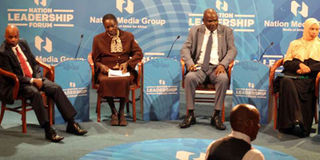Honing skills of the next crop of leaders

Leaders of various institutions participate in a leadership forum at the Nairobi of University on June 29, 2017. In Kenya, leaders are expected to be charismatic, inspirational, visionary and team-oriented. PHOTO | DENNIS ONSONGO | NATION MEDIA GROUP
What you need to know:
- Honesty, intelligence and decisiveness emerge as the leadership traits that matter most.
- Collaboration across borders is considered the most important trait a leader can possess.
As Kenya, the UK and the rest of the world confront global challenges, effective leadership will matter more than ever.
But what constitutes good leadership? Research by Cambridge University for the British Council has highlighted some skills the next generation of leaders will need to navigate an increasingly globalised and interdependent future.
MINDSET
Research conducted by the Institute for Sustainability Leadership suggests that a “global mindset” is a critical leadership attribute to cultivate, developing skills of open-mindedness, inclusivity, long-term and systemic thinking, and an ability to navigate complexity.
It looked at perspectives on leadership in the world with a focus on China, India, Egypt, Kenya and Mexico, offering comparisons of how leadership and development are understood across different regions.
VIRTUES
Honesty, intelligence and decisiveness emerge as the leadership traits that matter most.
In Kenya, leaders are expected to be charismatic, inspirational, visionary and team-oriented.
Some 77 per cent of Kenyans rank integrity as the most important characteristic of good leadership.
COLLABORATION
Security, climate change and migration are increasingly seen as too big to be solved by national governments alone.
Collaboration across borders is considered the most important trait a leader can possess.
This ‘global mind-set’ is seen by many as requiring skills and attitudes such as cosmopolitanism, a passion for diversity and inter-cultural empathy.
PARTICIPATION
‘Collaboration’ has also been found to be one of the top three expected leadership traits.
The Cambridge University study also highlights other interesting differences between various countries’ conceptions of leadership.
Many countries value consultative and participative leadership styles over more autocratic or ‘strong leader’ approaches.
CHARISMA
This may confound pundits who comment on the predisposition of some of these countries for strong leaders.
Charismatic leadership is the most popular approach in the world, and most preferred in the West.
POLICY
It is less popular in the Middle East and East Asia, which show greater preference for a more team-oriented approach.
According to the research, effective leadership is best exercised through policy change, often led by ‘policy entrepreneurs’, who are able to build broad coalitions and work across jurisdictions to create public value.
MAATHAI
Leaders like Nelson Mandela and Kwame Nkrumah fit this bill.
In Kenya, Nobel Peace Prize winner Wangari Maathai personified this type of leadership in her tireless efforts to build environmental awareness.
The new crop of leaders will need to demonstrate high order intercultural empathy as they collaborate with other nations to tackle challenges.
NETWORKING
Their leadership will, according to the research be exercised increasingly through policy change.
To support the next generation of Kenyan leaders to develop these skills, the British Council has launched Future Leaders Connect, a global network for emerging policy leaders from 11 countries.
Some 2,000 Kenyans applied to participate in it.
THINKERS
On Friday (July 21), at the Radisson Blu Hotel, Nairobi, 10 Kenyans will compete for the five places available in the first year of this new programme.
The five will join a global network of young people in the UK and across the world who will be among the shapers of global policy making in future.
MENTORSHIP
They will connect to some of the UK’s top institutions, develop leadership skills at Cambridge and attend meetings with inspiring leaders and policymakers.
This will culminate in a conference in the UK Houses of Parliament in October to discuss the most pressing global issues facing the next generation.
These issues may be challenging, but it is hoped that a new generation of leaders will have the skills needed to address them.
Tony Reilly, OBE, is the country director, British Council Kenya




